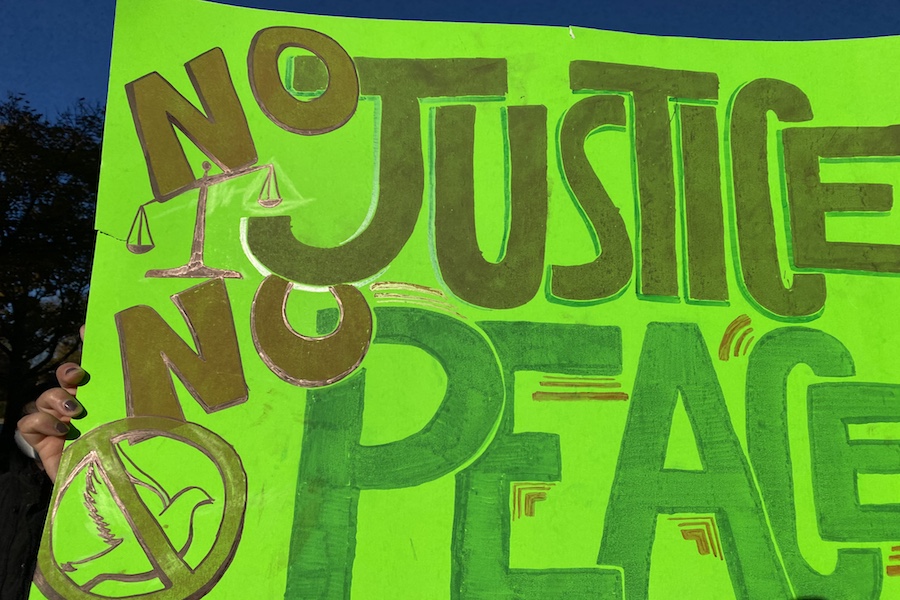NUCNC and FMO host teach-in on the history of prison abolition
Emily Sakai/Daily Senior Staffer
A sign from a previous NUCNC demonstration. NUCNC co-hosted a teach-in Tuesday with FMO on the history of prison abolition.
November 11, 2020
NU Community Not Cops collaborated with For Members Only to host a teach-in Tuesday on the oppressive nature of the US prison system and the need for its abolition.
The teach-in, attended by over 100 audience members, was the third part of a week-long series titled “Y’all Better Not Embarrass Me in Front of Angela Davis,” to prepare for Angela Davis’ State of the Black Union on Thursday.
At the teach-in, presenters asked participants to question what crime is and think about the role criminalization plays in the prison-industrial complex. Criminalization, one presenter said, makes “a facet of one reality or identity” a crime, which can alter the broader perceptions of those identities.
“Law cannot remedy oppression because it is inherently oppressive,” she said. “It doesn’t incorporate intersectional identities and can be seen to fail the issues it’s meant to handle.”
The presenters broke down the idea of harm and how harm comes both on an individual and systemic level. These two conceptions of harm, one presenter said, are “deeply interconnected.”
The distinction between crime and harm, another presenter said, and targeting harm rather than people or actions is “at the heart” of the abolitionist movement.
“Legality in carceral systems don’t accurately reflect harm,” one presenter said. “It can be dangerous and a gross overgeneralization to equate the two things.”
The presentation also addressed the scale of the US carceral system. The population of incarcerated people in America has seen a 500 percent increase within the last 40 years — the highest incarceration rate in the world.
The system, presenters explained, was created to “punish Black and Indigenous people of color,” with Black people being incarcerated at rates five times those of White people.
The presenters discussed the harms done by incarceration, such as the “devastating impact on mental and physical health” of incarcerated populations, especially in the context of the COVID-19 pandemic. Across the country, prisoners have been placed in crowded and unsafe situations.
“And even after leaving or having received their punishment, prisoners continue to live as second-class citizens,” one presenter said. “(They face) discrimination in employment, access to public housing and in some states, facing voter disenfranchisement.”
Discussing the history of prisons, one presenter noted the growth in the prison population during the 1980s despite the decline in violent crime. This had to do with the war on drugs, which disproportionately targeted Black communities, along with the militarization of police.
Presenters emphasized many of the measures that have increased incarceration rates in recent decades have been pushed for by Democrats and Republicans alike.
“This is bipartisan, and without the work of abolitionists, this crisis would just continue to propagate,” the presenter said.
The teach-in ended with discussions of the lives and work of Angela Davis and Ruth Wilson Gilmore, two key figures in the prison abolition movement. Attendees were then divided into breakout rooms to discuss the alternatives to the current prison system.
“Could we provide an alternative to the carceral system? What better things can we do since this one’s not effective and clearly oppressive?” one presenter asked.
Email: [email protected]
Twitter: @em_sakai
Related Stories:
— NUCNC and FMO co-host teach-in on policing alternatives
— NUCNC explains differences between police reform and abolition
— FMO to host activist Angela Davis at this year’s State of the Black Union


